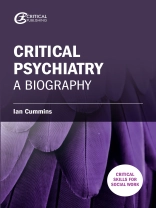Critical Psychiatry outlines the history of a group of thinkers that has come to be known as the anti-psychiatry movement. Though it has been called a movement, the individual thinkers’ and authors’ ideas were often in conflict but what they share is a critical perspective on psychiatry as a discipline and institutionalised modes of care.
The current crisis in mental health services means that it is time to examine once again the key themes of critical psychiatry. The excesses of the 1960s radicalism have meant that these themes – with an emphasis on the individual dignity of all those involved in mental health services – have been lost. These need to be rediscovered as part of a solution to current difficulties but also as the starting point for a new model of service provision.
Critical Psychiatry is a history of ideas. It provides a critical evaluation of key thinkers and the application of their work to contemporary mental health service settings.
Daftar Isi
Introduction
R.D. Laing: the psychiatrist of the counterculture
Michel Foucault: the man in the high castle
Erving Goffman: madness, and the asylum as a total institution
Frantz Fanon: Black Minds Matter – race, psychiatry and revolutionary politics
Thomas Szasz: a libertarian challenge to the ‘therapeutic state’
Franco Basaglia: psychiatry as radical politics
David Rosenhan: an experiment revisited
Plath, Frame and Casey: psychiatry and the literary imagination
Conclusion
Bibliography
Index
Tentang Penulis
Ian Cummins is senior lecturer in social work at the University of Salford. His main research revolves around the experiences of people with mental health problems in the Criminal Justice system with a focus on policing and mental illness. This is linked to an exploration of the development of the penal state and its interaction with community based mental health services. He is interested in the ways the CJS has become, in many incidences, the default provider of mental health care












